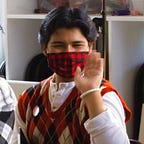Cuchillos
The kitchen table: it’s square, small, and intimate. Sizzling corn, smoke, and the stench of steak on the grill permeate the Newtown air, it’s bitter and harsh on the nostrils. What a beautiful sight in the eyes of an outsider: Mother sitting next to you, with family in front, feasting on the Earth’s bounties.
What so many fail to realize is that family food gatherings are weapons, they are knives. Food brings up the feelings of fear, vulnerability, judgment, and shame that sink into your heart as sharp eyes point menacingly at the colorful pigment upon your eyes, the tone of your voice, your mannerisms, your way of dress, the way you hold yourself up.
It’s a painful and terrifying feeling, the feeling of being the stain upon the family name, the talk of a town in a land thousands of miles away. It’s an infuriating feeling, the feeling of sitting amongst cowards who pretend not to see the knives brought to the table. It’s a terrible feeling, the feeling of white rice, corn, steak, and greens cutting your throat from the inside as you perform. Perform to comfort others, to be familiar, to not startle, to not shake things up, to not stand out, because heaven forbid you exist. It’s a strange feeling, the feeling of listening to heavy chatter that means so little because your very presence speaks volumes.
You stare off into space and recall sitting at a table, with a wide, stupid smile on your face, eating Venezuelan empanadas and yellow rice, they are not from your homeland, but they might as well be. Your chosen sisters, Jamila and Jae, sit at another table. The room is filled with beautiful people, each bringing in their personhood, their essences, their unique laughter and smiles. You all watch in awe and jump out of your seats as your friends vogue against each other, twirling and spinning around the room. Here, in the basement under Orange Street, you smell heaven and can touch the clouds, you can unclench the muscles in your face and rest the eyes, and taste the warm bread, chicken, and cheese mix of the Venezuelan empanada as they press upon the roof of your mouth. You’re free. You’re with family, and for a few hours, everyone forgets about their struggles and stresses. Everyone forgets about the overworld. Here, in the basement under Orange Street, you live with authenticity, love openly, and eat gleefully. You embrace your sisters and cousins, related by stories, not by blood. Delight, triumph, exultation, jubilation, euphoria, bliss, happiness; no amount of words and synonyms can express the feeling of finally being free from the weight and shadows of the theater curtains.
But you hold back tears as you refocus and look down at your plate of sustenance, thinking about how you will probably never get to share that experience of freedom, fruitful feasts, and unfiltered joy around kin like so many of your counterparts talk about.
A part of you dies every time you dine with kin.
You make brief eye contact with the loud, dark brown-eyed man in front of you, inspecting. You quickly turn your head to the side to watch the smoke outside the window from the roasting chicken.
Hiraeth, the feeling of longing for a home that never was. You feel it on your body. It’s cloudy, gray, and heavy on the chest and behind the ears. You grieve for the old you. You grieve for the you that was full of wonder, wrapped with warmth like a well-crafted uma. You grieve for the you that actually believed that the Empire loves you, that believed that the homeland will protect you. The weight is almost unbearable, pestering you as you perform. Although it’s dreadful, in the performance, you’re safe but empty.
All of what makes you, you, is muzzled, and violently ripped apart from you, and stuffed into a box, for a few hours of peace.
Your body, a shell as tough as the thick rib-eye steak sitting in front of you that hurts when you sink your teeth into it to pull it apart. Your wounded soul, smiling out of submission, talking with a faux charismatic and pleasant tone, as if it were begging for mercy from intrusive questions, stares, and awkward conversations.
Begging for mercy from the knives.
You grieve for the broken promises that were made to you, for the shattered dreams of wonder, but you’re one of the lucky ones. So many people will never have a place like the basement under Orange Street, so many people will never experience love.
Sorrow fills your heart and shatters like a porcelain plate, worn out by poverty, falling on the ground as you have a moment of silence and grieve for the children like you who do not yet know that they have been condemned to a box, a frightening theater stage, and a lifetime of their kin bringing knives to the dinner table.
